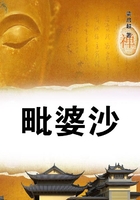There's nothing final.So,when things are as you don't like them,remember that and bear them;and when they're as you do like them,remember it and make the most of them--and keep a good sleeve handy!""Have you got any creed at all?"he demanded.
"Certanly;but I don't live up to it."
"That's not expected.May I ask what it is?"
"It's in Latin."
"Well,I can probably bear it.Aunt Eliza had a classical tutor for me."I always relish a chance to recite my favorite poet,and I began accordingly:--"Laetus in praesens animus quod ultra est Oderit curare et--""I know that one!"he exclaimed,interrupting me."The tutor made me put it into English verse.I had the severest sort of a time.I ran away from it twice to a deer-hunt."And he,in his turn,recited:--"Who hails each present hour with zest Hates fretting what may be the rest,Makes bitter sweet with lazy jest;Naught is in every portion blest."
I complimented him,in spite of my slight annoyance at being deprived by him of the chance to declaim Latin poetry,which is an exercise that Iapprove and enjoy;but of course,to go on with it,after he had intervened with his translation,would have been flat.
"You have written good English,and very close to the Latin,too,"I told him,"particularly in the last line."And I picked up from the bridge which we were crossing,an oyster-shell,and sent it skimming over the smooth water that stretched between the low shores,wide,blue,and vacant.
"I suppose you wonder why we call this the 'New Bridge,'"he remarked.
"I did wonder when I first came,"I replied.
He smiled."You're getting used to us!"
This long structure wore,in truth,no appearance of yesterday.It was newer than the "New Bridge"which it had replaced some fifteen years ago,and which for forty years had borne the same title.Spanning the broad river upon a legion of piles,this wooden causeway lies low against the face of the water,joining the town with a serene and pensive country of pines and live oaks and level opens,where glimpses of cabin and plantation serve to increase the silence and the soft,mysterious loneliness.Into this the road from the bridge goes straight and among the purple vagueness gently dissolves away.
We watched a slow,deep-laden boat sliding down toward the draw,across which we made our way,and drew near the further end of the bridge.The straight avenue of the road in front of us took my eyes down its quiet vista,until they were fixed suddenly by an alien object,a growing dot,accompanied by dust,whence came the small,distorted honks of an automobile.These fat,importunate sounds redoubled as the machine rushed toward the bridge,growing up to its full staring,brazen dimensions.Six or seven figures sat in it,all of the same dusty,shrouded likeness,their big glass eyes and their masked mouths suggesting some fabled,unearthly race,a family of replete and bilious ogres;so that as they flew honking by us I called out to John:--"Behold the yellow rich!"and then remembered that his Hortense probably sat among them.
The honks redoubled,and we turned to see that the drawbridge had no thought of waiting for them.We also saw a bewildered curly white dog and a young girl,who called despairingly to him as he disappeared beneath the automobile.The engine of murder could not,as is usual,proceed upon its way,honking,for the drawbridge was visibly swinging open to admit the passage of the boat.When John and I had run back near enough to become ourselves a part of the incident,the white dog lay still behind the stationary automobile,whose passengers were craning their muffled necks and glass eyes to see what they had done,while one of their number had got out,and was stooping to examine if the machine had sustained any injuries.The young girl,with a face of anguish,was calling the dog's name as she hastened toward him,and her voice aroused him:he lifted his head,got on his legs,and walked over to her,which action on his part brought from the automobile a penetrating female voice:--"Well,he's in better luck than that Savannah dog!"But General was not in luck.He lay quietly down at the feet of his mistress and we soon knew that life had passed from his faithful body.
The first stroke of grief,dealt her in such cruel and sudden form,overbore the poor girl's pride and reserve;she made no attempt to remember or heed surroundings,but kneeling and placing her arms about the neck of her dead servant,she spoke piteously aloud:--"And I raised him,I raised him from a puppy!"The female voice,at this,addressed the traveller who was examining the automobile:"Charley,a five or a ten spot is what her feelings need."The obedient and munificent Charley straightened up from his stooping among the mechanical entrails,dexterously produced money,and advanced with the selected bill held out politely in his hand,while the glass eyes and the masks peered down at the performance.Eliza La Heu had perceived none of this,for she was intent upon General;nor had John Mayrant,who had approached her with the purpose of coming to her aid.
But when Charley,quite at hand,began to speak words which were instantly obliterated from my memory by what happened,the young girl realized his intention and straightened stiffly,while John,with the rapidity of light,snatched the extended bill from Charley's hand,and tearing it in four pieces,threw it in his face.
A foreign voice cackled from the automobile:"Oh la la!il a du panache!"But Charley now disclosed himself to be a true man of the world--the financial world--by picking the pieces out of the mud;and,while he wiped them and enclosed them in his handkerchief and with perfect dignity returned them to his pocket,he remarked simply,with a shrug:"As you please."His accent also was ever so little foreign--that New York downtown foreign,of the second generation,which stamps so,many of our bankers.















